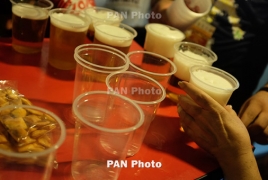
The team found carbonised germinated grains on a scale that indicated that malt was being produced for beer brewing on a large scale. The remnants of the grain were found in Uppåkra in southern Sweden, The Drinks Business says.
Specialist in archaeobotany, Mikael Larsson commented: “We found carbonised malt in an area with low-temperature ovens located in a separate part of the settlement. The findings are from the 400-600s, making them one of the earliest evidence of beer brewing in Sweden”.
Evidence of brewing has been found in Mesopotamia dating to as early as 4000 BC, however, due to the absence of written records in Sweden prior to 1200 AD, archaeologists have to rely on botancial evidence.
Larsson continued: “We often find cereal grains on archaeological sites, but very rarely from contexts that testify as to how they were processed. These germinated grains found around a low-temperature oven indicate that they were used to become malt for brewing beer”.
The ovens found at the site are thought to have been used for the final stage of the malting process whereby the germinated grain is dried once enough sugar has been produced.
Larsson added: “Because the investigated oven and carbonised grain was situated in an area on the site with several similar ovens, but absent of remains to indicate a living quarter, it is likely that large-scale production of malt was allocated to a specific area on the settlement, intended for feasting and/or trading,” explains Mikael Larsson.
Evidence of brewing in Scandinavia dating back to 100 AD has been found in Denmark and also on the island of Öland dating to around 500 AD.
Larsson said: “From other archaeological sites in the Nordic region, traces of the bog-myrtle plant have been found, which indicates beer brewing. Back then, bog-myrtle was used to preserve and flavour beer. It wasn’t until later during the Middle Ages that hops took over as beer flavouring”.
Uppåkra is one of the largest known Iron Age settlements in southern Scandinavia and was once a thriving political and religious centre. Findings previously uncovered at the site suggest it was also a significant trading hub.
Beer has been produced in Armenia since ancient times. In the 5th century BCE, after arriving at a village in Ancient Armenia (possibly in the territory of Artsakh), Xenophon wrote in the Anabasis that "There were stored wheat, barley, vegetables, and barley wine in the craters (clay pots). In upper level of vessels with the edges in the wine floated barley, and there was stuck a reed, large and small sizes and who wanted to drink, had to take a reed in his mouth and pull it through the wine. Not mixed with water, the wine was very strong, but for local people it was a very pleasant drink".

